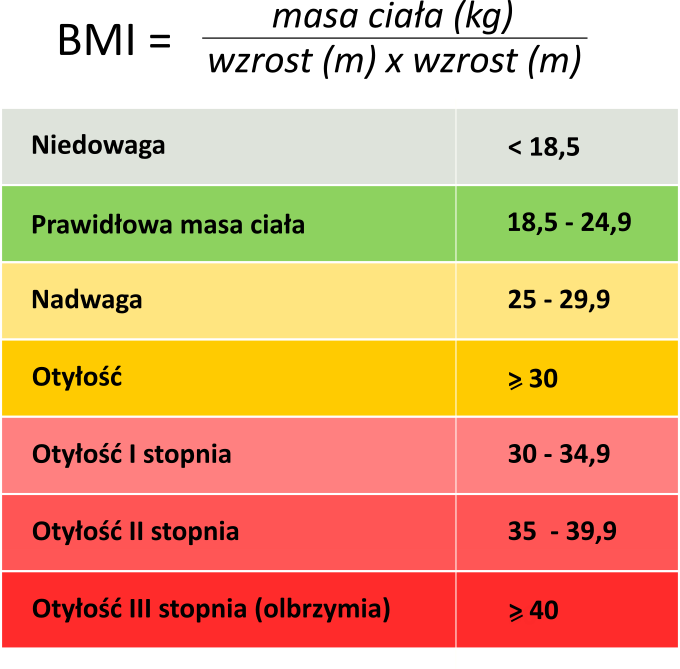Dlaczego nie mogę schudnąć? Otyłość to nie defekt kosmetyczny
Światowa Organizacja Zdrowia (WHO) alarmuje, że na przestrzeni zaledwie 30 lat (1980-2008) odsetek osób otyłych na świecie podwoił się. Również w Polsce możemy mówić o prawdziwej epidemii otyłości. Ponad 50 % osób dorosłych w naszym kraju ma nadwagę, zaś otyłych jest około 20 % Polaków (według niektórych danych nawet 25 %)! Eksperci przewidują, że jeśli nie zmienimy zdecydowanie stylu życia, w 2035 roku w Polsce otyła będzie już nie co piąta, ale co trzecia osoba.
Przyczyny nadmiernej masy ciała
Nie wystarczy powiedzieć: „Jesz za dużo. Jedz mniej i więcej się ruszaj a problem sam się rozwiąże.” Przyczyn otyłości jest wiele i są one skomplikowane. Niemniej jednak do odkładania się tkanki tłuszczowej prowadzi dodatni bilans energetyczny, który jest wynikiem zaburzonej równowagi pomiędzy ilością energii dostarczanej do organizmu a tej, którą jesteśmy w stanie spalić. Wiąże się to z dostępem do wysokoprzetworzonej żywności, bogatej w cukry proste i tłuszcz, nieregularne posiłki lub ich pomijanie, podjadanie kalorycznych przekąsek. Dochodzą do tego czynniki genetyczne oraz środowiskowe, siedzący tryb życia, zbyt niska aktywność fizyczna, pośpiech i przewlekły stres, choroby przewlekłe i efekty uboczne przyjmowania niektórych leków, zaburzenia w ośrodku kontroli głodu i sytości, będące efektem przekarmiania. Jedzenie jest ściśle powiązane z naszą psychiką, emocjami, może pełnić rolę pocieszenia lub nagrody.
Czym jest otyłość?
Trzeba jasno podkreślić, że otyłość to choroba. W międzynarodowej klasyfikacji chorób ma ona swój numer (E-66). Jest to nadmierne nagromadzenie się tkanki tłuszczowej w ciele powyżej 30% u kobiet i powyżej 20% u mężczyzn. Żeby ocenić procentową zawartość tkanki tłuszczowej w organizmie należy wykonać badanie składu ciała na profesjonalnym urządzeniu (analiza składu ciała).
Prostszym sposobem jest wyliczenie BMI (Body Mass Index, wskaźnik masy ciała) i jego interpretacja na podstawie klasyfikacji WHO, zamieszczonej w tabeli.

Możesz również zmierzyć swój obwód pasa na wysokości pępka. Redukcję masy ciała zaleca się w szczególności, gdy wynosi on ≥ 88 cm u kobiet oraz ≥ 102 cm u mężczyzn. Najkorzystniej byłoby jednak, gdyby obwód pasa u kobiet nie przekraczał 80 cm, natomiast u mężczyzn 94 cm.
Dlaczego otyłość jest niebezpieczna?
Otyłość jest chorobą, która stanowi zagrożenie dla zdrowia i życia. Znacznie zwiększa ryzyko cukrzycy typu 2, nadciśnienia tętniczego, dyslipidemii, chorób pęcherzyka żółciowego, insulinooporności. U osób otyłych częściej występuje choroba niedokrwienna serca, zawał serca, udar mózgu, bezdech senny, zadyszka, choroba zwyrodnieniowa stawów, dna moczanowa, zespół policystycznych jajników, zaburzenia hormonalne, zaburzenia płodności, niektóre rodzaje nowotworów (np. rak jelita grubego, sutka, jajników, prostaty, chorób wątroby i dróg żółciowych). Otyłości często towarzyszą również bezsenność, stany depresyjne związane m. in. z niską samooceną i brakiem akceptacji przez otoczenie. Dlatego WARTO zmniejszyć masę ciała, przede wszystkim DLA ZDROWIA.
Od czego zacząć leczenie otyłości?
Pierwszym krokiem może być wizyta u lekarza rodzinnego, który zleci podstawowe badania krwi i oceni stopień otyłości. Niezbędnym elementem leczenia będzie modyfikacja stylu życia obejmująca zmiany w sposobie odżywiania połączone z dostosowaną do możliwości aktywnością fizyczną. Na tym etapie bardzo pomocne jest wsparcie doświadczonego dietetyka, który zaplanuje strategię postępowania. Należy pamiętać, że „dieta cud” nie istnieje. Rolą dietetyka jest pomoc w trwałej zmianie Twoich nawyków żywieniowych w bezpieczny i zdrowy sposób.
Czasami konieczne może być również połączone z dietoterapią leczenie farmakologiczne lub w bardzo zaawansowanych sytuacjach chirurgiczne leczenie otyłości (CHLO). W przypadku gdy lekarz stwierdzi otyłość, leczenie jej może być refundowane przez NFZ.
mgr Natalia Parulska
Dietetyk kliniczny

